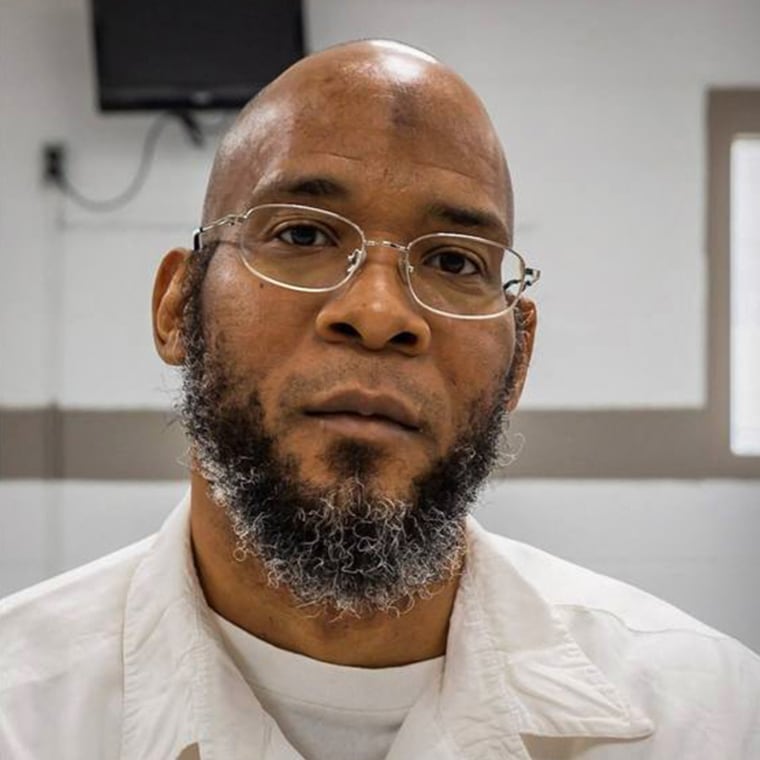Marcellus Williams executed in Missouri after prosecutor tried to stop it
A Missouri man convicted of murder was executed Tuesday evening after efforts by his attorneys as well the prosecutor’s office to halt it were rejected by the governor and Supreme Court.
Marcellus Williams, 55, was executed for a 1998 murder that he has said he did not commit, The Associated Press reported.
The U.S. Supreme Court earlier Tuesday evening denied a stay of execution. Missouri Gov. Mike Parson, a Republican, and the Missouri Supreme Court on Monday rejected requests to halt the execution.
U.S. Rep. Cori Bush, D-Missouri, who represents the St. Louis area, was among those who said Williams should not have been executed.
“Governor Mike Parson shamefully allowed an innocent man to be executed tonight. We must abolish this flawed, racist, inhumane practice once and for all,” she wrote on X. “Rest in power, Marcellus Williams.”
Williams’ attorneys argued that his DNA was not on the murder weapon and that his 2001 jury trial was unfair. They also raised doubts about the actions of a trial lawyer in the case.
St. Louis County Prosecuting Attorney Wesley Bell also sought to halt the execution, saying DNA experts concluded Williams was excluded from DNA found on the murder weapon through testing that was not available at the time of the trial.
Williams was convicted of first-degree murder and sentenced to death for the killing of Felicia “Lisha” Gayle, a newspaper reporter who was found stabbed to death in her home in the St. Louis area in 1998.

On Monday, a day before Williams was executed by injection, his lawyers argued before the Missouri Supreme Court that his execution should be halted because the trial lawyer for the prosecution in the 2001 trial said at a recent hearing that he struck a Black man from the jury because of his race and that the prosecution mishandled the murder weapon.
“The prosecutor in Marcellus Williams’ case has admitted under oath that he struck a juror in part because of his race,” attorney Jonathan Potts said at Monday’s hearing.
Potts said the trial prosecutor struck a Black man “in part because he was a young man with glasses” and looked similar to Williams.
“He admitted that there was actually a racial component here, and that is unconstitutional,” he said.
The jury included one Black member.
Potts also argued that the trial prosecutor mishandled the murder weapon in bad faith when he held it without gloves, contaminating the knife, which they say could have been used to prove Williams was innocent.
Assistant Attorney General Michael Spillane denied that the potential juror was struck because he was Black, saying: “There’s no clearly convincing evidence here. There’s no evidence at all.”
He also said that based on procedures at the time, the attorney did not mishandle the evidence.
The state Supreme Court rejected Williams’ arguments, saying that, “Despite nearly a quarter century of litigation in both state and federal courts, there is no credible evidence of actual innocence or any showing of a constitutional error undermining confidence in the original judgment.”
At the time of the trial, an inmate who shared a cell with Williams and a former girlfriend both said Williams confessed to them that he was responsible for the murder. His attorneys have said the two were seeking reward money.
In January, Bell, the St. Louis County prosecutor, filed a motion to vacate or set aside Williams’ conviction and sentence, citing the DNA experts who said Williams was excluded from DNA on the murder weapon.
Ahead of that hearing, tests showed the DNA was consistent with that of members of the prosecution team from the original trial, who had touched the knife without gloves.
With that piece of evidence allegedly contaminated, the office of Bell, a Democrat, and attorneys for Williams reached a deal that would spare Williams the death penalty in exchange for life in prison without parole.
A St. Louis County circuit judge and Gayle’s family also agreed to the deal, but state Attorney General Andrew Bailey, a Republican, opposed it, and the state Supreme Court agreed.
A judge ultimately rejected the motion to vacate, a ruling Williams’ attorneys appealed to the state Supreme Court on Monday.
The NAACP also asked Missouri’s governor in a letter last week to stop the execution, saying it “would amount to a horrible miscarriage of justice and a perpetuation of the worst of Missouri’s past.”
“Taking the life of Marcellus Williams would be an unequivocal statement that when a White woman is killed, a Black man must die. And any Black man will do,” the NAACP said in the letter.
Parson said in a statement Tuesday that Williams would be executed.
“Mr. Williams has exhausted due process and every judicial avenue, including over 15 hearings attempting to argue his innocence and overturn his conviction,” Parson said. “No jury nor court, including at the trial, appellate, and Supreme Court levels, have ever found merit in Mr. Williams’ innocence claims.”
Tuesday was third time that Missouri sought to execute Williams. His execution was stayed twice before — in 2015 and 2017.
In 2017, then-Gov. Eric Greitens, also a Republican, stayed Williams’ execution hours before he was to have been put to death after evidence showed he was not the source of the DNA on the murder weapon.
Greitens convened a “board of inquiry” to investigate Williams’ claims, Williams’ attorneys argued in a motion seeking a U.S. Supreme Court stay, but that board was dissolved by Parson in 2023 without issuing a report or recommendations.
“It is believed the BOI never reached a decision,” Williams’ attorneys wrote.
The U.S. Supreme Court’s three liberal justices, Sonia Sotomayor, Elena Kagan and Ketanji Brown Jackson would have granted the stay of execution, the court wrote.

